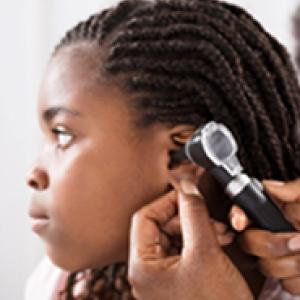
The National Institute on Deafness and Other Communication Disorders (NIDCD), part of the National Institutes of Health, conducts and supports biomedical and behavioral research and research training in the normal and disordered processes of hearing, balance, taste, smell, voice, speech, and language. The NIDCD aims to reduce the burden of hearing loss and communication disorders in the U.S. and around the globe.
Why is global health research important?
Global health research is essential for advancing biomedical research because it informs our own best practices and improves the effectiveness of diverse health care delivery models. Ultimately, this improves the health of people worldwide.
Global health is an integral part of many research projects, programs, and initiatives implemented by both the extramural and intramural divisions of the 27 institutes and centers that comprise the National Institutes of Health (NIH). The NIDCD supports the mission coordinated by the NIH and the Fogarty International Center (FIC), which is to support and facilitate global health research conducted by U.S. and international investigators, build partnerships between health research institutions in the U.S. and abroad, and train the next generation of scientists to address global health needs.
How does the NIDCD address global health?

The NIDCD supports and facilitates global health research at both domestic and foreign institutions. The NIDCD funds collaborations between U.S. and international researchers at institutions worldwide, expanding the scientific workforce and improving access to the world’s collective scientific talent and expertise. The NIDCD also aims to train the next generation of scientists to address global health concerns in deafness and other communication disorders.
By supporting international research, the NIDCD can accelerate the discovery of causes and interventions for deafness and other communication disorders. For example, NIDCD-supported international collaborations based in the NIDCD intramural program facilitated the collection of genetic data from families around the world affected by deafness and stuttering. This research uncovered gene variations associated with these conditions and provided additional insights into their causes and potential targeted treatments.
What are some current international initiatives related to the NIDCD’s mission areas?

A major catalyst for increased interest in global hearing health care was the World Health Assembly (WHA) resolution on the prevention of deafness and hearing loss, issued in May 2017. The WHA is the governing body of the World Health Organization (WHO). To facilitate implementation of the resolution, WHO established the World Hearing Forum, a global network of stakeholders, in 2018. The NIDCD is one of 138 agencies and organizations that comprise the forum. The WHA resolution called for WHO to publish the first World Report on Hearing (launched in 2021). This report highlights evidence-based best practices and priorities for ear and hearing health care and reflects a variety of cultural contexts and approaches.

The Lancet Commission on Global Hearing Loss will build on the World Health Assembly’s drive to reduce the immense burden of hearing loss worldwide. Led by world experts in hearing, public health, economics, and engineering, among other areas, the commission seeks innovative solutions focused on prevention, policy, technology, and protection, and on how these themes interact. NIDCD Director Debara L. Tucci, M.D., M.S., M.B.A., is serving as a commission co-chair. The commission plans to publish a report in 2025 to address the economics of global hearing health policy, best practices for hearing health care delivery, accessibility of hearing health technology, and sociocultural barriers to accessing hearing health care.

According to WHO, we face a worldwide, substantial, and ever-increasing need for rehabilitation, especially with the aging population and the rise of age-related hearing loss and communication disorders. The NIDCD, through efforts led by the National Center of Medical Rehabilitation Research, part of the NIH’s Eunice Kennedy Shriver National Institute on Child Health and Human Development, has been engaged with the WHO Rehabilitation 2030 initiative. In 2019, the NIDCD, other NIH institutes, and the U.S. Agency for International Development (USAID) participated in the Second Global Rehabilitation 2030 meeting and a subsequent meeting, Health Policy and Systems Research Agenda for Rehabilitation.

